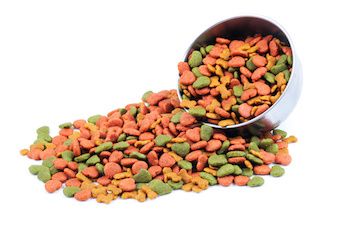The Changing Landscape of the Pet Food Industry
Although pet food sales are growing, some major manufacturers are not celebrating. Here's why.

Pet food spending surpassed $32 billion this year, but not all major players in the market are feeling victorious, largely because of 2 trends that seem to be dictating the today's pet food industry.
First, the majority of pet owners consider their pets to be family members and are willing to go the extra mile to make sure their furry friends are well pampered. Added to this is a shift toward feeding foods with organic components and those that are free from artificial flavors and ingredients. In short, run-of-the-mill kibble is no longer satisfactory for Fido and Fluffy.
While these trends bode well for the many niche products that have been introduced in recent years, mainstream pet food manufacturers are starting to feel the effects.
Big Investments Show Signs of Strain
Three of the largest pet food manufacturers made significant investments to grow their business over the past few years, but those investments may not be panning out exactly as expected. In April, for example, General Mills made headlines when it purchased Blue Buffalo for $8 million. Although General Mills’ pet food sales did rise in the last quarter, the growth did not match that which Blue Buffalo experienced in the years leading up to the sale.
In fact, stocks for General Mills, J.M. Smucker, and Nestle have all dropped recently. The blame for this is not solely on pet food sales, however. Some of the companies’ food products for humans are struggling as well. “The challenges you see across both industries are actually quite similar,” Chris Mondzelewski, vice president of customer development at Mars Inc.’s North America petcare business, told the The Wall Street Journal.
Smaller Pets May Mean Smaller Profits
Research has shown that the size of pets has had an impact on the industry as well. As many as 50% of pet dogs in 2016 weighed in at 25 lb or less. And even though dogs are still the most popular pet in US households, the number of specialty and exotic pets is on the rise. Some analysts believe that the growing popularity of smaller pets may correspond to fewer potential pet food sales because smaller pets consume smaller portions.
What’s Next?
It is clear that a shift in the pet food industry is underway, but many manufacturers may be questioning how far should they venture into the realm of holistic diets and natural ingredients. After all, human-grade ingredients come with higher price tags, and some pet owners are not willing to pay that price. General Mills' acquisition of Blue Buffalo and J.M. Smucker’s purchase of the Rachael Ray Nutrish line exemplify, however, that even the largest companies are dipping their toes in healthier waters.
As the market continues to grow and the variety of pets people bring into their homes widens, it will be up to manufacturers and retailers—both new and established—to rework their growth strategies based on emerging trends. An example of this for 2019 may be Petco’s decision to remove items with artificial ingredients from its stores and online marketplace. Initially, the retailer stands to lose more than $100 million in annual sales from the new business model, but will the move eventually prove to be lucrative? Will other companies follow suit? Stay tuned.
Episode 67: Choosing trusted supplements
October 20th 2021In this episode of The Vet Blast Podcast, Dr Adam Christman chats with Dr Janice Huntingford about the latest insights into selecting the best supplements for your patients, including the importance of recommending and utilizing products that have a substantial amount of science and research behind them. (Sponsored by Vetoquinol)
Listen